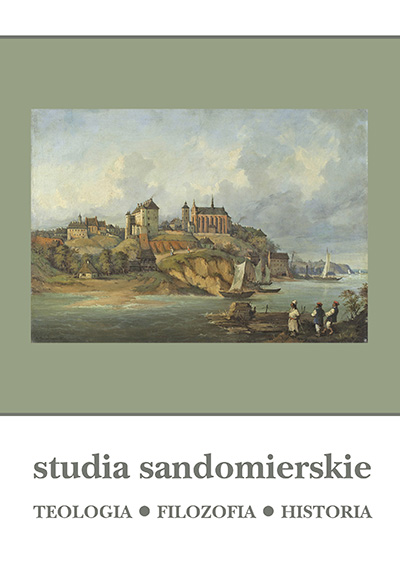Saul’s παρρησία in Damascus and Jerusalem
DOI:
https://doi.org/10.15633/sts.4182Keywords:
Παρρησία, παρρησιάζομαι, courage, boldness, preaching, Saul, Paul, ActsAbstract
The Greek terms of παρρησία and παρρησιάζομαι assumed great importance during the 6th century BC in Athens. These words defined the right of a free citizen to speak at the General Assembly. He was obligated to tell the truth, even at the expense of persecution. These concepts also functioned in the private sphere and in philosophy The authors of the Holy Scriptures eagerly used them. They occur eleven times in the Acts of the Apostles. St. Luke uses παρρησιάζομαι as a verb in chapter 9 of Acts to describe the attitude of the converted Saul who preaches the word of God in Damascus and Jerusalem. Despite the difficulties which arise, he does not change anything in the Gospel message. Παρρησία is a charisma bestowed upon man by the Holy Spirit. The action of the Holy Spirit is crucial to a proper understanding of the above terms in Acts. Because of this action, παρρησία is no longer the privilege of free citizens only, as in ancient Athens, but a grace that enables even simple and unlearned people to speak boldly and courageously about Christ.
References
Bartnicki R., Dzieje głoszenia słowa Bożego. Jezus i najstarszy Kościół, Kraków 2015.
Biel S., Paweł z Tarsu na misyjnym szlaku, Kraków 2015.
Chrostowski W., Między synagogą a Kościołem. Dzieje św. Pawła, Kraków 2015.
Dąbrowski E., Dzieje Pawła z Tarsu, Warszawa 1953.
Foucault M., Fearless Speech, Los Angeles 2001.
Fredrickson D.E., ΠΑΡΡΗΣΙΑ in the Pauline Epistles, w: Friendship, Flattery, and Frankness of Speech: Studies on Friendship in the New Testament World, ed. by J. Fitzgerald, Leiden 1996, s. 163–183.
Gnilka J., Paweł z Tarsu, Kraków 2001.
Grün A., Drogi ku wolności, Kraków 1999.
Haręzga S., Biblijna parresia i jej aktualność w świetle encykliki „Redemptoris missio”, „Ateneum Kapłańskie” 84 (1992), t. 118, z. 2, s. 293–306.
Hesemann M., Paweł z Tarsu. Archeolodzy tropem Apostoła Narodów, Poznań 2015.
Lamelas I.P., Parresia męczenników – odwaga w wyznawaniu wiary, „Communio. Międzynarodowy Przegląd Teologiczny” 23 (2003), nr 5 (137), s. 35–50.
Marrow S.B., Parrhesia and the New Testament, „The Catholic Biblical Quarterly” 44 (1982), s. 431–446.
Popowski R., Wielki słownik grecko-polski Nowego Testamentu, Prymasowska Seria Biblijna, Warszawa 2006.
Reale G., Historia filozofii starożytnej, t. 3, Systemy epoki hellenistycznej, Lublin 2010.
Rosik M., Duch Święty – źródło odwagi w głoszeniu słowa zbawienia (Dz 4,23–31), „Verbum Vitae” 2 (2002), s. 151–164.
Rosik M., Kościół a Synagoga (30–313 po Chr.) na rozdrożu, Wrocław 2016.
Schlier H., παρρησία, παρρησιάζομαι, w: Theological Dictionary of the New Testament, eds. G. Kittel, G. Friedrich, vol. 5, Grand Rapids 1967, s. 871–886.
Spicq C., Theological Lexicon of the New Testament, trans. and ed. by J.D. Ernest, CD, Peabody 1994. Electronic text hypertexted and prepared by OakTree Software, Inc. Version 3.1.
Strękowski S., Wolność (parrhesia) jako ostateczne odbudowanie podobieństwa Bożego w człowieku według św. Grzegorza z Nyssy, „Studia Ełckie” 8 (2006), s. 205–218.
Unnik W.C. van, The „Book of Acts”: The Confirmation of the Gospel, „Novum Testamentum” 4 (1960), s. 26–59.
Winter S. C., ΠΑΡΡΗΣΙΑ in Acts, w: Friendship, Flattery, and Frankness of Speech: Studies on Friendship in the New Testament World, ed. by J. Fitzgerald, Leiden 1996, s. 185–202.
Wronka S., Odwaga w Nowym Testamencie, „Materiały Homiletyczne” 290 (2015), Kraków 2014, s. 49–59.
Wróblewski W., Rozwój idei społeczeństwa obywatelskiego w Atenach w wieku VI i V przed Chrystusem, Toruń 2004.
Downloads
Published
Issue
Section
License
Copyright (c) 2021 Dariusz Nawara

This work is licensed under a Creative Commons Attribution-NonCommercial-NoDerivatives 4.0 International License.
Twórca oświadcza, że przysługują mu prawa autorskie do utworu i że nie są ograniczone w zakresie objętym niniejszym oświadczeniem oraz że utwór jest dziełem oryginalnym i nie narusza praw autorskich innych osób.
Twórca zezwala Uniwersytetowi Papieskiemu Jana Pawła II w Krakowie na nieodpłatne, niewyłączne i nieograniczone w czasie korzystanie z utworu, to jest:
- utrwalanie i zwielokrotnianie: wytwarzanie egzemplarzy utworu techniką drukarską, reprograficzną, zapisu magnetycznego oraz techniką cyfrową;
- obrotu oryginałem albo egzemplarzami, na których utwór utrwalono (wprowadzanie do obrotu, użyczenie lub najem oryginału albo egzemplarzy, publiczne wystawienie, wyświetlenie, a także publiczne udostępnianie utworu w taki sposób, aby każdy mógł mieć do niego dostęp w miejscu i w czasie przez siebie wybranym);
- włączenie utworu w skład utworu zbiorowego;
- udzielanie przez Uniwersytet Papieski Jana Pawła II w Krakowie sublicencji Creative Commons Uznanie autorstwa 4.0 Międzynarodowe (CC BY 4.0)
Uniwersytet Papieski Jana Pawła II w Krakowie udostępnia utwór na Platformie Czasopism należącej do uczelni, na licencji Creative Commons Uznanie autorstwa 4.0 Międzynarodowe (CC BY 4.0). Tym samym uprawnia wszystkich zainteresowanych do korzystania z utworu pod następującymi warunkami:
- zostanie podany autor i tytuł utworu,
- zostanie podane miejsce publikacji (tytuł czasopisma i identyfikator DOI oryginalnie opublikowanego utworu).

